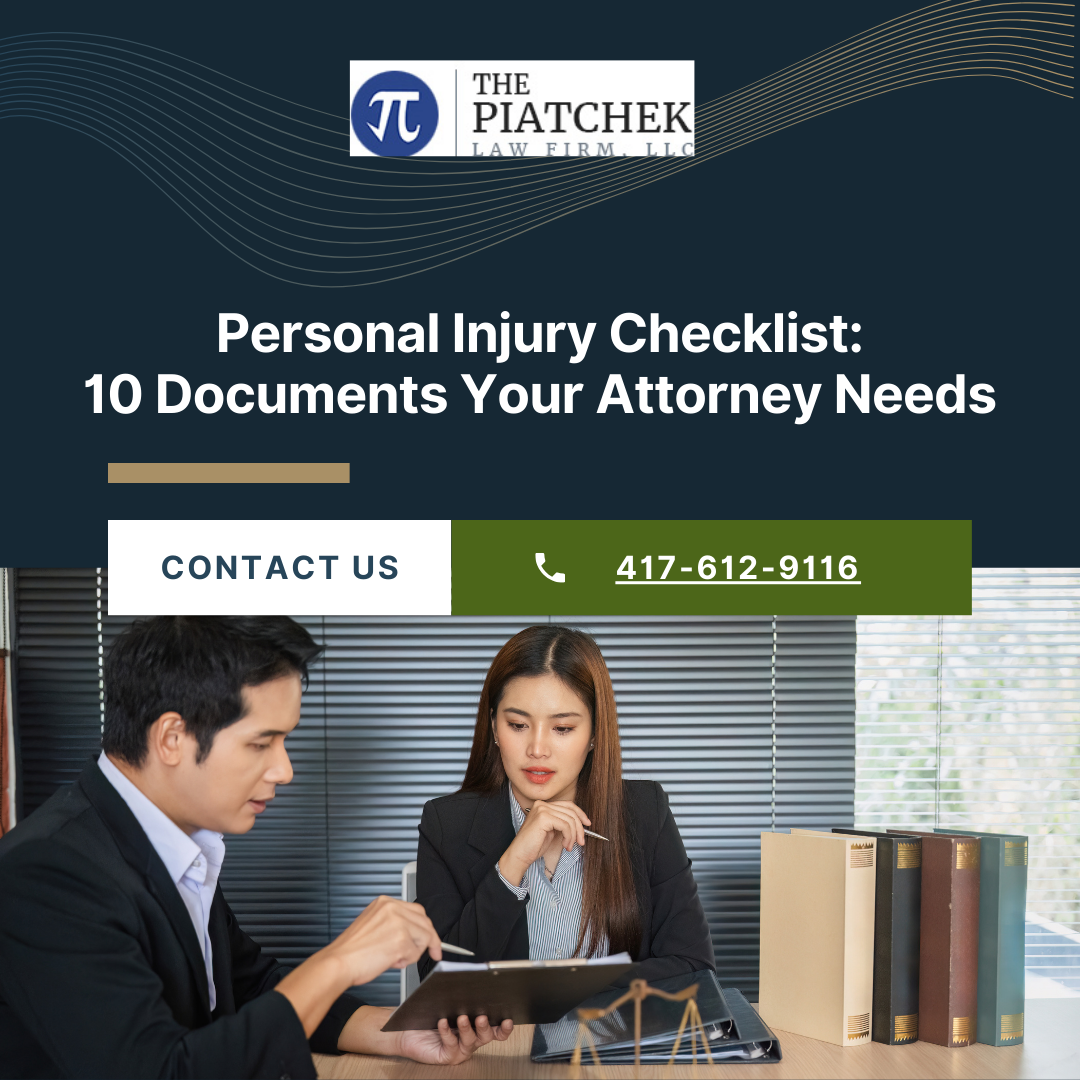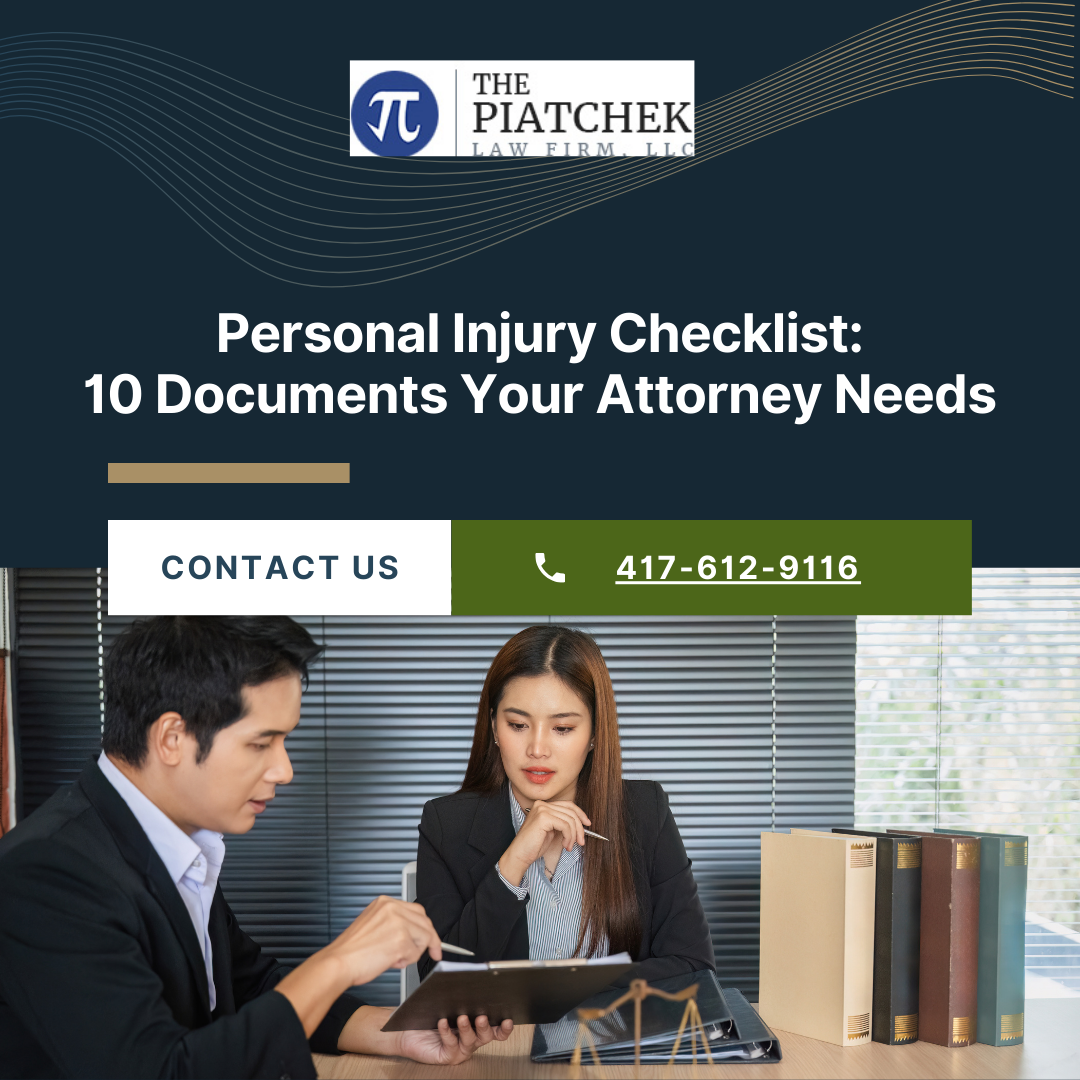Top 10 Documents That Strengthen Your Personal Injury Claim
Springfield, United States - September 29, 2025 / The Piatchek Law Firm, LLC /
When someone is injured in an accident, the road to recovery can feel overwhelming. Medical bills, time off work, and emotional stress all add up quickly. In the middle of it all, building a strong legal case may not seem like the first priority. But for those seeking compensation, providing the right documentation is essential. A personally injury attorney relies on accurate records to prove liability, calculate damages, and fight for fair compensation.
This checklist highlights the most important documents that help attorneys build a solid case.

Why Documentation Matters
Paperwork may not sound powerful, but in a personal injury case, it often makes the difference between a fair settlement and a denied claim. The right records:
Provide proof of how the accident happened.
Show the full extent of injuries and treatment.
Demonstrate the financial and personal impact on the injured person’s life.
Without solid documentation, even a skilled personally injury attorney will have a harder time persuading insurers or a jury.
Essential Documents for a Personal Injury Case
1. Accident or Police Report
Official reports give a clear record of the incident, including time, location, and those involved. For car accidents, workplace injuries, or slips and falls in public spaces, this document often serves as the foundation of a case.
2. Medical Records and Bills
Hospitals, clinics, and therapists keep detailed records of diagnoses, treatments, and follow-up care. Paired with itemized bills, these documents prove both the seriousness of injuries and the financial costs of recovery.
3. Photographs and Videos
Visual evidence can be powerful. Photos of the accident scene, damaged property, and visible injuries create a timeline of events that words alone can’t capture. Surveillance or smartphone video can be especially persuasive.
4. Witness Statements and Contact Information
Independent witnesses add credibility. Their accounts help support the injured person’s version of what happened. Collecting names, phone numbers, or written statements early is crucial.
5. Employment and Wage Records
Pay stubs, tax forms, and employer statements document lost income due to missed work. For more serious injuries, these records also help show reduced future earning capacity.
6. Insurance Information
Copies of relevant health, auto, or liability insurance policies are essential. Any correspondence with insurers about the accident should also be shared with the attorney.
7. Correspondence Related to the Incident
Emails, letters, or even text messages between the injured person, the other party, or insurers can become valuable evidence of responsibility or attempts to settle.
8. Receipts for Out-of-Pocket Expenses
Beyond medical bills, injuries often bring extra costs. Medication, medical devices, transportation to appointments, or home modifications should all be tracked and documented with receipts.
9. Personal Diary or Notes
A daily journal describing pain levels, emotional struggles, or limitations in daily life can highlight the non-economic impact of an injury. This evidence supports claims for pain and suffering.
10. Prior Medical History (if relevant)
If there are pre-existing conditions, medical history helps distinguish what injuries were caused or worsened by the accident. This prevents disputes and clarifies the true impact of the incident.
How Attorneys Use These Documents
A personally injury attorney uses this information to:
Build a clear timeline of events.
Show both economic damages (like lost wages and medical bills) and non-economic damages (like pain and suffering).
Strengthen negotiations with insurance companies.
Prepare a compelling case if the dispute goes to court.
The more complete and organized the documents are, the stronger the attorney’s ability to advocate becomes.
Tips for Clients
Start collecting documents right after the accident.
Keep both paper copies and digital scans for easy sharing.
Store everything in clearly labeled folders.
Provide all information—even details that may seem small or unimportant—to the attorney. Full honesty is critical for a successful case.
Building a Strong Case Starts with Good Records
Accidents create enough stress without the added challenge of gathering evidence. But documentation is the backbone of any personal injury claim. By collecting reports, medical records, photos, receipts, and other essential documents, clients give their personally injury attorney the tools to fight effectively on their behalf.
With careful preparation and the right legal support, victims can focus on healing while knowing their case is built on a strong foundation.

Contact Information:
The Piatchek Law Firm, LLC
1200 East Woodhurst Drive T-200
Springfield, MO 65804
United States
Joseph Piatchek
(417) 612-9116
https://ozarkslawfirm.com/
Original Source: https://ozarkslawfirm.com/personal-injury-lawyer/

